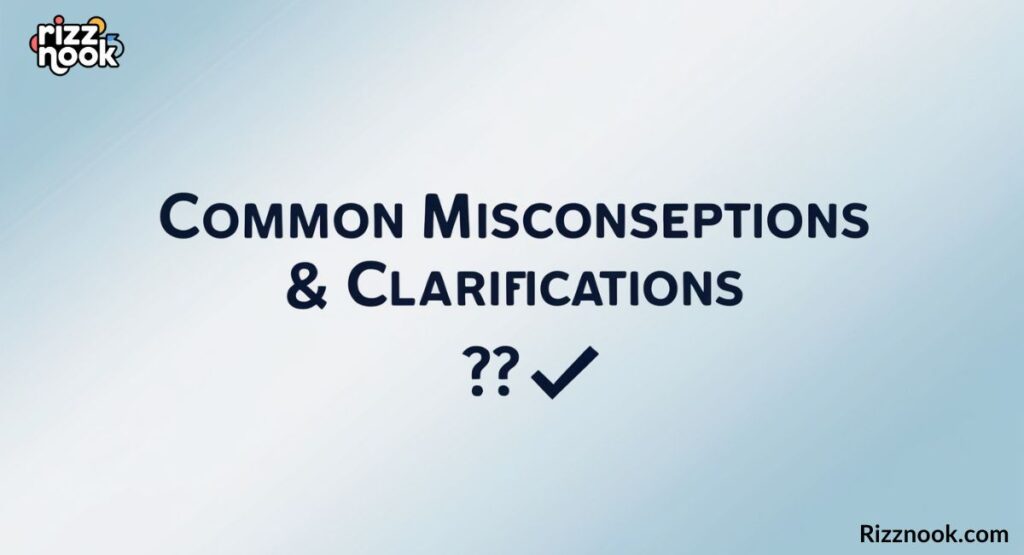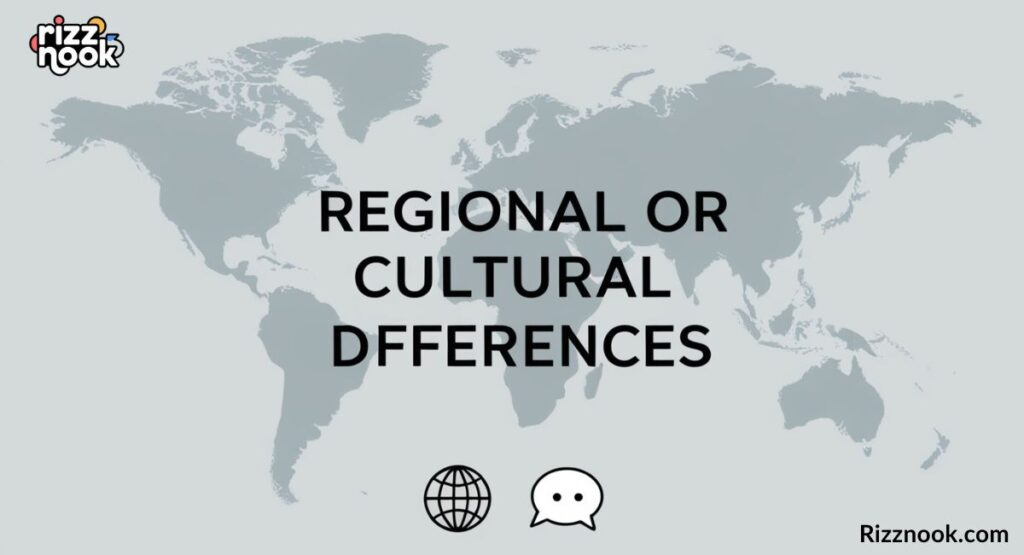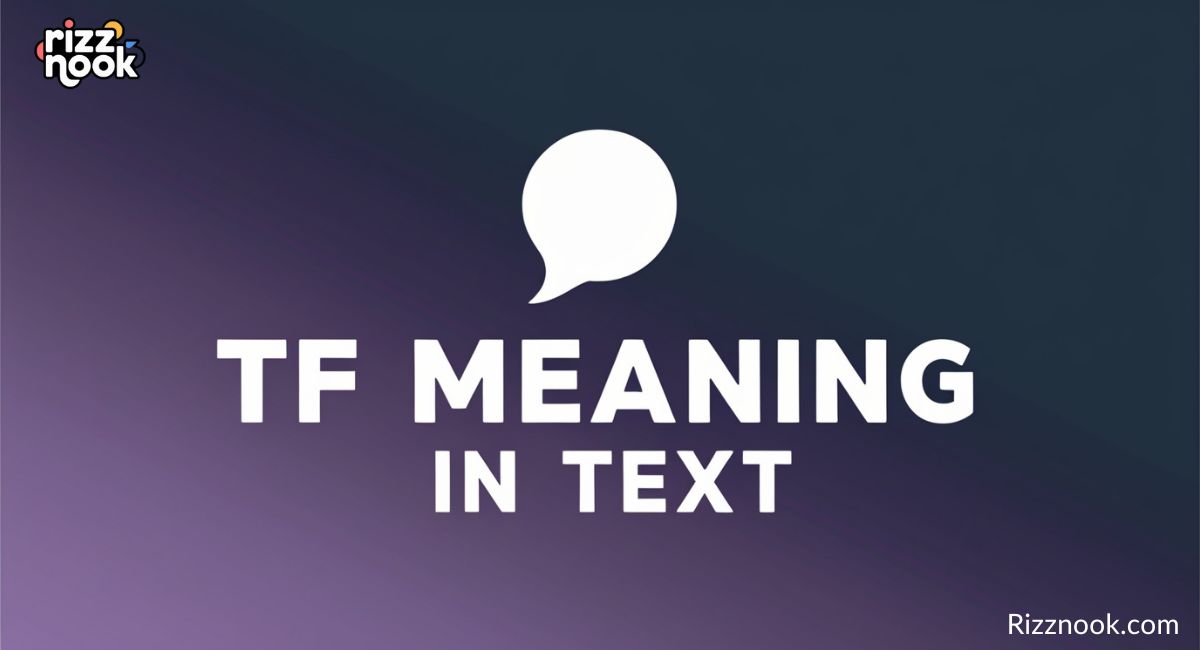Ever seen TF in a message and paused for a second? 😅 Don’t worry, you’re not alone! This small but powerful acronym shows up everywhere in texting, social media comments, memes, and even gaming chats. Understanding the TF meaning in text helps you respond appropriately and stay in the flow of the conversation.
From expressing shock, confusion, or just strong emotion, TF adds emphasis and attitude in a fun, casual way. Whether you’re scrolling through TikTok, replying on WhatsApp, or chatting with friends, knowing how to use TF makes your messages clearer and more expressive.
In this guide, we’ll break down what TF stands for, where it came from, and how you can use it smoothly like a pro. Let’s begin!
Definition & Meaning
TF serves as an abbreviated slang for “The F***” in digital communication, functioning as compressed profanity that conveys strong emotional reactions to unexpected or frustrating situations. It maintains informality while slightly reducing the explicit impact of the full phrase.
Key Points:
- TF operates as instant shorthand for expressing astonishment, bewilderment, or irritation, comparable to exclamations like “Seriously?” or “Are you kidding me?”
- The abbreviation flourishes predominantly within younger demographics who frequently engage in casual digital conversations across messaging apps and online gaming platforms.
- While rooted in vulgar language, TF provides a toned-down alternative that allows users to convey intensity without spelling out explicit profanity directly.
- TF’s emotional weight varies dramatically based on surrounding context, punctuation choices, and the relationship dynamics between conversation participants.
Examples:
- Friend 1: “The restaurant lost our entire reservation! 😡”
- Friend 2: “TF? Did they at least apologize? 😳”
- Gamer 1: “The server kicked me right before winning! 😭”
- Gamer 2: “TF, that’s absolutely brutal timing! 😱”
- Coworker 1: “Meeting got rescheduled for the third time today! 📅”
- Coworker 2: “TF is going on with scheduling? 🤦”
Context, tone, and delivery determine whether TF reads as mildly surprised or intensely frustrated; always consider the conversational atmosphere!
Background & History
TF as “The F***” originated from evolving digital communication patterns and internet vernacular:
- Origin: The underlying expletive has existed in English language usage for centuries as an intensifier, but TF’s abbreviated form surfaced during the early 2000s when character limits and typing efficiency drove the creation of countless text message shortcuts.
- Evolution: TF gained significant momentum through early internet chatrooms, message boards, and instant messaging platforms before exploding across Twitter, Facebook, and Instagram, where brevity became essential for engaging digital audiences effectively.
- Cultural Adoption: Gen Z and millennials embraced TF as standard vocabulary within their online lexicons, transforming it from niche internet slang into mainstream digital communication recognized across multiple platforms and communities worldwide.
- Alternative Interpretations: While TF occasionally references Task Force in military or corporate discussions, or Team Fortress within specific gaming circles, these meanings represent minimal usage compared to the dominant expletive interpretation in casual texting.
Key Points:
- TF experienced rapid adoption throughout the 2000s alongside the explosive growth of mobile messaging and social networking platforms 📱.
- The abbreviation primarily functions as an emotional amplification tool within relaxed, informal communication environments rather than conveying literal information.
- Contemporary usage positions TF as universally recognized internet slang throughout English-speaking territories and digitally connected global communities 🌍.
- TF reflects broader linguistic trends where digital natives continuously compress language for speed, efficiency, and emotional impact in fast-paced online interactions.
Usage in Various Contexts
TF adapts to different communication environments and serves multiple purposes:
- Text Messaging 📲:
- Functions as an immediate response to unexpected or bewildering situations.
- Conveys emotions ranging from mild confusion to intense disbelief.
- Example:
- Friend: “My interview got cancelled five minutes before! 😑”
- You: “TF? Did they even give a reason? 😕”
- Social Media Platforms 🐦:
- Appears frequently in comment sections and tweet replies.
- Helps users express collective surprise at trending topics.
- Example:
- Post: “Concert tickets jumped from $50 to $300 overnight! TF? 😲 #Outrageous”
- Reply: “This needs to be illegal honestly 😤”
- Online Gaming Communities 🎮:
- Serves as shorthand for frustration during competitive matches.
- Communicates disbelief at game mechanics or opponent behavior.
- Example:
- Gamer 1: “Lag made me lose the final round! 😤”
- Gamer 2: “TF, that’s the third time today! 😣”
- Everyday Conversations 🗣️:
- Punctuates informal dialogue with emotional emphasis.
- Replaces longer phrases to maintain conversation flow.
- Example:
- Friend: “They’re remaking that classic movie again! 🎬”
- You: “TF? Hollywood has zero new ideas! 😩”
- Professional Group Chats 💼:
- Occasionally appears in casual work environments (use cautiously).
- Expresses surprise about last-minute changes or announcements.
- Example:
- Coworker: “Meeting moved to 7 AM tomorrow! ⏰”
- You: “TF? Guess I’m skipping breakfast 😅”
- Meme Culture and Internet Humor 😂:
- Enhances comedic timing in reaction images and videos.
- Amplifies the punchline of relatable or absurd content.
- Example:
- Meme Caption: “When you check your bank account after the weekend… TF happened? 💸😱”
Essential Insight: TF thrives on spontaneity and emotional authenticity, always consider your audience and the conversation’s tone before using it! 🎯
Common Misconceptions & Clarifications

| Misconception | Clarification |
| TF is completely harmless slang suitable for any conversation. | While TF softens profanity, it still carries an edge that may offend conservative or unfamiliar audiences. Context and relationship matter significantly. |
| TF always means the same thing regardless of platform or conversation. | Though predominantly meaning “The F***” in texting, interpretation varies by generation, region, and social circle. Always gauge your audience first. |
| Using TF in work emails or professional chats is acceptable if you’re friendly with colleagues. | Professional environments demand polished communication standards. Even casual workplace relationships shouldn’t include potentially crude abbreviations in written formats. |
| TF can be used interchangeably with WTF without any difference in tone. | TF typically expresses milder surprise or confusion, while WTF conveys stronger shock or anger. The intensity levels differ noticeably. |
| Only younger generations use TF in their messages. | While popular among Gen Z and Millennials, people across age groups adopt internet slang. However, older users might misinterpret or feel uncomfortable with it. |
| TF stands for “That’s Funny” or “Too Far” in most texting scenarios. | These alternative meanings exist but are extremely uncommon. Assuming TF means anything other than “The F***” in casual texts leads to miscommunication 95% of the time. |
Key Point: Reserve TF exclusively for relaxed, informal exchanges where everyone understands internet slang conventions and shares similar communication comfort levels.
Similar Terms & Alternatives
Here are expressions that convey surprise, confusion, or frustration similar to TF:
- Are you kidding me
- What in the world
- You’ve got to be joking
- That’s crazy
- Come on now
- For real
Comparison Table:
| Term | Meaning | Best Used In | Tone Level |
| TF | Abbreviated form of “The F***” | Casual texting, online gaming chats | Strong/Edgy |
| What the Heck | Softened expression of confusion or surprise | Family-friendly conversations, mixed audiences | Mild/Safe |
| No Way | Direct disbelief or astonishment | Every day, informal discussions | Moderate/Neutral |
| Seriously | Questioning tone expressing frustration or doubt | Semi-casual contexts, workplace banter | Moderate/Professional |
| Are You Kidding Me | Extended reaction to unbelievable situations | Face-to-face conversations, video calls | Moderate/Expressive |
| What in the World | Bewilderment about unusual occurrences | Cross-generational chats, public forums | Mild/Polite |
| For Real | Seeking confirmation or expressing genuine shock | Close friendships, relaxed group settings | Moderate/Contemporary |
Key Point: Select alternatives based on your relationship with the recipient and the conversation’s formality level. “What the heck” or “Seriously” work universally without risking offense. ✅
How to Respond to This Term
Your reply to TF should align with the conversation’s emotional temperature and context:
Casual Response
- Acknowledge their frustration with empathy and understanding.
- Keep your tone relaxed and supportive without overcomplicating things.
- Example:
- Friend: “The restaurant lost our reservation! TF? 😡”
- You: “That’s so annoying! Want to try somewhere else? 😣”
Humorous Response
- Play along with lighthearted banter to defuse tension.
- Add comedic elements that build on the absurdity they’re pointing out.
- Example:
- Gamer: “The enemy respawned right behind me! TF? 😅”
- You: “Classic spawn camping! Game hates you today 😂”
Professional Response
- Rephrase their concern using workplace-appropriate language.
- Focus on problem-solving rather than mirroring their informal expression.
- Example:
- Colleague: “Budget got cut in half! TF?”
- You: “That’s certainly unexpected. Should we discuss adjustments to the timeline?”
Neutral Response
- Provide balanced acknowledgment without intense emotional investment.
- Offer practical help or simple reassurance as needed.
- Example:
- Friend: “TF, my car won’t start this morning! 🚗”
- You: “That’s rough timing! Need a ride, or should I call someone? 😊”
Sympathetic Response
- Validate their feelings when they’re genuinely upset or stressed.
- Show genuine concern while maintaining appropriate boundaries.
- Example:
- Friend: “Failed my driving test again! TF is wrong with me? 😞”
- You: “Don’t be so hard on yourself! Lots of people need multiple tries. You’ll get it! 💪”
Inquisitive Response
- Ask clarifying questions to better understand the situation.
- Demonstrate interest in the details behind their reaction.
- Example:
- Friend: “My package was delivered to the wrong address! TF? 📦”
- You: “Wait, seriously? Did the tracking say it was delivered to your place? 🧐”
Key Point: Mirror the conversation’s energy level while maintaining your personal communication standards, and avoid using TF yourself in formal responses regardless of how others phrase things. 🧠
Regional or Cultural Differences

TF experiences varying levels of acceptance and interpretation across different geographical and cultural contexts:
- English-Speaking Nations 🌎: TF representing “The F***” has become standard slang in the United States, Canada, United Kingdom, and Australia, particularly among Millennials and Gen Z who engage heavily with digital communication platforms.
- Non-English Speaking Territories 🌍: The abbreviation sees limited usage outside Anglophone regions since the underlying profanity doesn’t translate directly. However, international gaming communities sometimes interpret TF as Team Fortress, creating potential confusion in multiplayer environments.
- Cultural Sensitivity Considerations: Conservative societies and traditional family structures often view TF as disrespectful or vulgar due to its connection with explicit language. Religious communities and formal cultural settings typically discourage such abbreviated profanity entirely.
- Generational Divides 👥: Older generations across all regions tend to perceive TF as unnecessarily crude or confusing, while younger demographics embrace it as standard internet vernacular. This age gap creates communication barriers in intergenerational exchanges.
- Professional Environments Worldwide 💼: Regardless of geographic location, corporate cultures universally frown upon TF in business correspondence, meetings, and official documentation. International companies maintain strict professional language policies that exclude casual internet slang.
- Social Media Platform Variations 📱: Different platforms attract distinct user demographics, influencing TF usage patterns. Twitter and Reddit see higher TF frequency compared to LinkedIn or professional networking sites, even when users come from identical cultural backgrounds.
Key Point: TF thrives primarily in informal, English-dominated digital spaces among younger users; exercise cultural awareness and contextual judgment before incorporating it into conversations with diverse audiences. 🌐
Comparison with Similar Terms
| Term | Meaning | Key Difference | Audience Suitability |
| TF | Abbreviated form of “The F***” | Carries edgy, intense emotional weight in digital conversations | Close friends, gaming communities |
| What the Heck | Softened exclamation of bewilderment | Family-appropriate alternative without offensive undertones | All ages, mixed company |
| No Way | Expression of pure disbelief | Universally understood with zero controversial elements | Universal settings, cross-cultural |
| Seriously | Questioning statement showing skepticism | Slightly elevated formality while maintaining a conversational feel | Semi-professional, broader contexts |
| OMG | “Oh My God,” expressing shock | Religion-linked but widely normalized in mainstream usage | Social media, youth-oriented spaces |
| WTF | Full version “What The F***” | More aggressive and explicit than TF’s shortened form | Very casual, adult-only environments |
| Are You Kidding | An extended phrase showing astonishment | Complete sentence structure makes it more deliberate and clear | Spoken conversations, video chats |
Key Point: TF distinguishes itself through compressed intensity and modern digital culture roots, making it ideal for quick, emotionally charged reactions in relaxed online environments. ✨
Usage in Online Communities & Dating Apps
TF has carved out distinct roles across various digital platforms:
Twitter/X
- Functions as an instant commentary on viral news and trending controversies.
- Amplifies collective outrage or astonishment in reply threads.
- Example:
- Post: “Gas prices jumped 40 cents overnight! TF? 😤 #Economy”
- Reply: “This is getting ridiculous, honestly 😕”
Dating Apps
- Appears in bios to signal casual, humorous personality traits.
- Used during conversations to react playfully to unexpected profile details.
- Example:
- Bio: “Living for spontaneous adventures and TF moments 😄”
- Message: “TF, you climbed Mount Kilimanjaro? That’s incredible! 😲”
Gaming Communities
- Serves as shorthand for frustration during technical difficulties or glitches.
- Communicates immediate shock at unexpected gameplay developments.
- Example:
- Discord: “TF, the boss regenerated full health! 😣”
- Reply: “No way, is that a bug or a new update? 👀”
Reddit Forums
- Pepper’s comment sections on subreddits dedicated to storytelling and confessions.
- Enhances relatability when users share bizarre personal experiences.
- Example:
- Thread: “Coworker microwaved fish in the office again. TF is wrong with people? 🐟”
- Comment: “This should be a fireable offense tbh 😂”
Instagram & TikTok
- Appears in captions to boost engagement on shocking or humorous content.
- Used in comment reactions to influencer announcements or reveals.
- Example:
- Caption: “Tried making sourdough and it exploded in the oven. TF happened? 🍞😱”
- Comment: “This is peak 2025 energy right here 💀”
Professional Networking Platforms
- Extremely rare and generally avoided to maintain credibility.
- Occasional appearance in very casual industry-specific groups with understood boundaries.
- Example:
- Industry Slack: “Client wants everything redesigned by Monday. TF? 😅”
- Response: “Time to set some realistic expectations there!”
Tips:
- On dating apps, deploy TF strategically to showcase humor without appearing immature or overly aggressive.
- In gaming contexts, add clarification when necessary to distinguish between emotional reactions and references like Team Fortress.
- Gauge each online community’s communication norms before introducing potentially edgy abbreviations. 🚀
Hidden or Offensive Meanings
TF carries certain communication risks worth considering:
- Potential Offense: TF’s connection to explicit language can alienate recipients who value polite discourse or come from conservative backgrounds.
- Misinterpretation Hazards: Alternative meanings like Task Force or Team Fortress occasionally create confusion in professional or gaming contexts where acronyms overlap.
- Context Sensitivity: Deploying TF in workplace emails, family group chats, or formal discussions damages your professional image and credibility.
- Generational Gaps: Older audiences unfamiliar with internet slang may perceive TF as disrespectful or nonsensical rather than casual expression.
Key Point: Reserve TF exclusively for relaxed, peer-level conversations where everyone shares similar communication comfort zones. 😊
Suitability for Professional Communication
TF has no place in the workplace or formal business settings:
- Informal Tone 📝: TF’s roots in profanity and internet slang create an unprofessional impression in corporate emails, business reports, client presentations, or official documentation.
- Alternative Interpretations: While Task Force represents a legitimate professional term, this meaning rarely applies in modern texting contexts, leading to potential workplace misunderstandings.
- Career Impact Concerns: Using TF in professional correspondence can damage your reputation, suggesting poor judgment, immaturity, or lack of workplace awareness to supervisors and colleagues.
- Client Relations Risk: External communications containing TF may offend clients, partners, or stakeholders who expect polished, respectful business language regardless of industry informality trends.
Alternatives:
- Instead of “TF was that meeting about?” say “What was the purpose of that meeting?”
- Instead of “TF, the project scope changed!” use “I’m surprised the project scope changed without notice.”
- Instead of “TF happened to the budget?” try “Could you clarify what occurred with the budget allocation?”
Key Point: Maintain clear, respectful professional vocabulary in all work-related communications to preserve credibility and demonstrate workplace maturity. 💼
Examples of TF Used in Real Conversations
Real-world scenarios demonstrate how TF functions across different communication contexts:
- Between Friends Discussing Plans: “TF, you forgot to buy the tickets? The concert’s tomorrow! 😱” showing frustration about a missed responsibility.
- In Group Chats Reacting to News: “Did you see the new iPhone price? TF, who’s paying $1500 for a phone? 💸” expressing collective shock at pricing.
- Gaming Session Commentary: “TF just happened? The game glitched and I lost all my progress! 😤” conveying immediate frustration during gameplay.
- Social Media Response to Trends: “TF is this new dance challenge? I can’t keep up anymore 😂” reacting humorously to viral content.
Frequently Asked Questions
What does TF meaning in text?
TF usually stands for “the f*”**, used to express shock, confusion, or strong emotion.
What is the meaning of TF on social media?
On social platforms, TF is used to react to surprising, confusing, or unbelievable situations.
Is TF slang or an abbreviation?
Yes, TF is internet slang and shorthand used for emphasis in casual chats.
How do I use TF in a sentence?
You place TF before or after a word to show a strong reaction. Example: “What TF just happened?”
Is TF considered rude?
Yes, TF can sound rude or offensive because it’s linked to a strong swear word. Use it carefully.
What does TF mean in gaming chats?
In gaming, TF expresses surprise or frustration during gameplay moments.
Does TF have a polite meaning?
Not really. It is almost always used with emotional or intense expression.
Conclusion
Understanding the TF meaning in text helps you stay confident and clear when chatting online. Whether you’re reacting in WhatsApp messages, Instagram comments, or gaming chats, this acronym adds emotion and emphasis. Just remember, it carries a strong tone, so use it in casual conversations only.
As language and internet slang continue to evolve, expressions like TF, WTF, and other texting abbreviations will remain part of everyday communication. Now that you know what TF means and how to use it, you’re ready to join the conversation without confusion. Stay expressive, stay aware, and chat like a pro!
Read Next: OMS Meaning in Text: Your Ultimate Guide to This Handy Acronym

Welcome to Rizz Nook! I am Kairo, an AI-powered SEO and Content writer with 4 years of experience. I help websites rank higher, drive more traffic, and look great. My goal is to make SEO and web design simple and effective for everyone. Let’s achieve more together.


